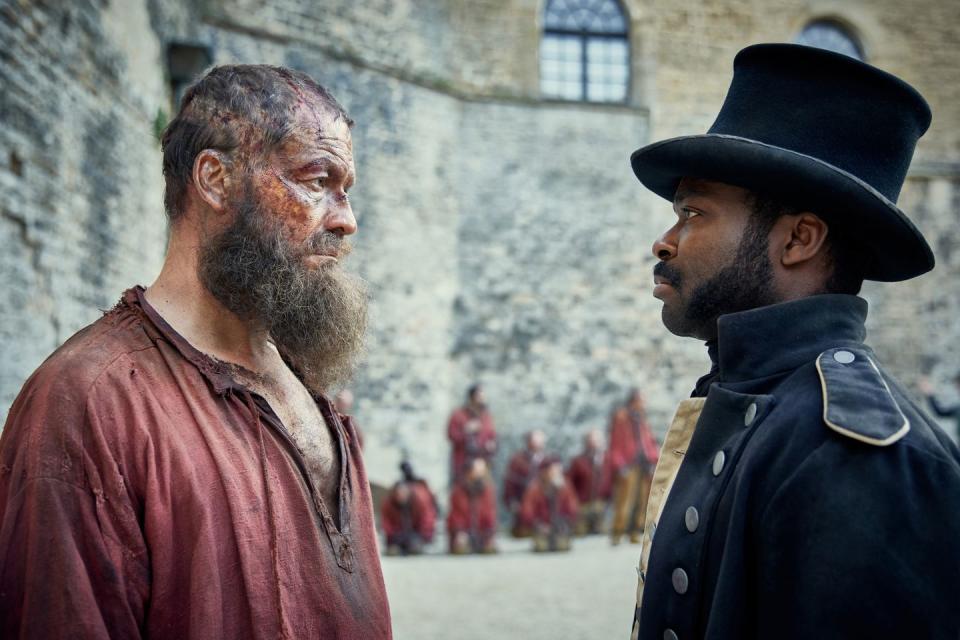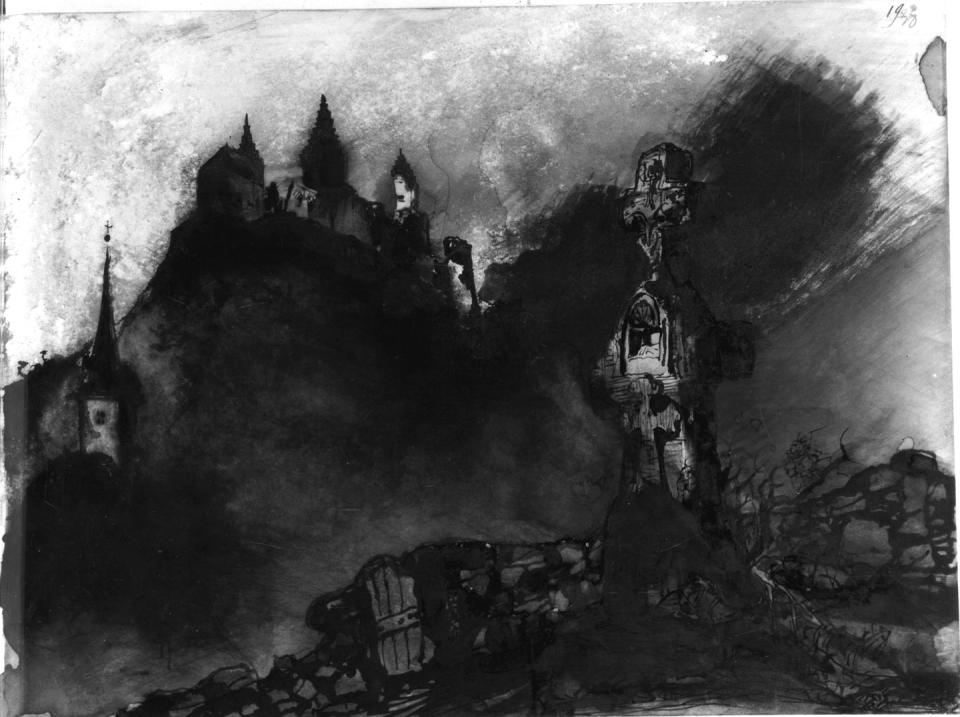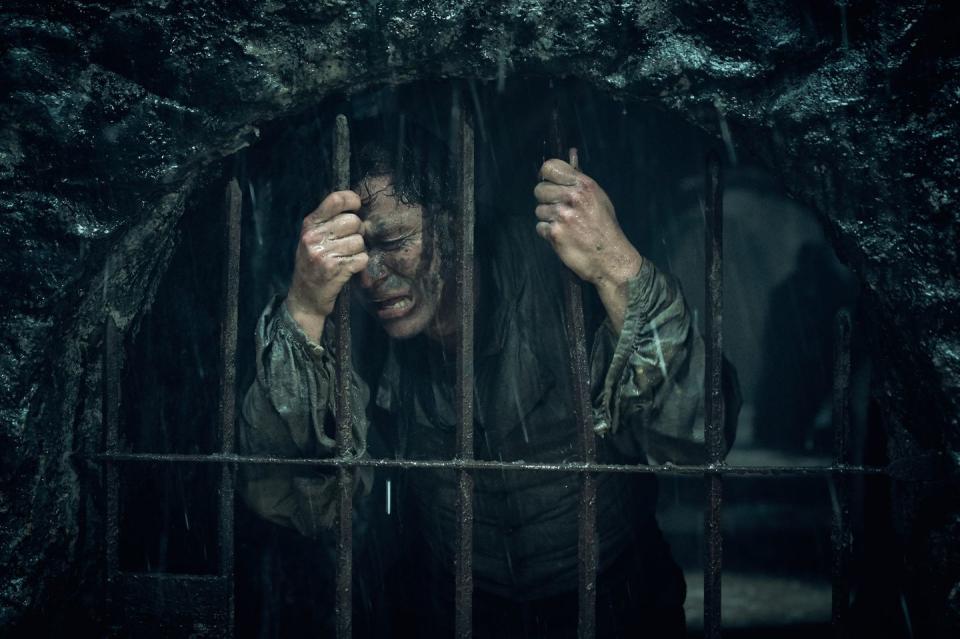Why Les Misérables's Dominic West Thinks Jean Valjean Is a Better Hero Than Spiderman

Dominic West laughs easily, smiles warmly. His character in Masterpiece PBS's Les Misérables, the long-suffering ex-convict Jean Valjean, does not.
If anything, Valjean is West's idol, rather than his counterpart-and so is Victor Hugo, the author behind the original 1862 novel, which West declares is "the best book I've ever read." Here, West opens up about why the story remains resonant today, his character's many haircuts, and the debatable value of the Les Mis musical.

What it’s like playing a character that changes so much physically during the show?
Yeah, this is a performance mainly based on hairstyles. I have a big wig and a ponytail and then I have my own hair. And then we planned it so that at the end I could shave off all my hair and film the start of the the show at the end. So I start in prison with chopped-up hair, and then I die with the same chopped-up hair.
It’s funny how things like hairstyles do actually dictate your performance... In some ways that affects the way you play it, because Valjean returns to what he’s most comfortable with, and where he thinks he belongs, which is in prison. I think so much of his psychology is about his guilt of an institutionalized person, who’s been brutalized in an institution, and believes that’s the only place he belongs. So all that comes from hairstyle.
Did you have to lift some weights for the role?
I did a bit of boxing training, which is the most brutal. But I did a bit of that because it’s difficult when you read the script and it says “this is the toughest guy in the world,” and you go, “Christ, I think they’ve miscast it.” So I did a bit of that, yeah. Inevitably, you have to beef up, try and be tough. But at my age it gets harder.

I know you’ve played a lot of bad guys. What it was like to play one of the most famous good guys ever?
Heaven. Heaven, heaven. Such a relief. You spend a lot of time with these characters and you have to live with them and you have to think the way they think. For whatever reason, the way I look or something, I get to play a lot of assholes. And it’s interesting, because the devil has the best jokes, but eventually it becomes wearing, and evil, and… Bad people are ultimately empty. They’re ultimately not nourishing. Not interesting. And good people are.
[Valjean] such a great hero. He’s such a strong man, who’s been through hell, and is constantly fighting with his bestial nature to be a good guy... And that’s why this character has survived as long as he has and been central to people’s affections for 150 years or whatever. He’s the greatest hero in literature, and he’s amazing. You know, he climbs the side of a building like Spiderman, he can beat anyone up as well as Ironman, but not of those guys did 20 years hard labour in a 19th century jail. So he’s tough, but he’s a deeply compassionate guy.
What was it like working opposite David Oyelowo as Javert?
The first question I had was, what is Javert’s problem? Why is he so obsessed with this guy Valjean? He crosses the whole of France in order to become his head of police in the town that Valjean has moved to. And to me, it was obvious that, I mean you always go for the strongest impulses, and the strongest impulses are usually love, hate, and sex. So I said, he’s obviously in love with him, he’s got some thing for Valjean. And the director didn’t want to make that too explicit, because it slightly narrows the interpretation of the book. But we did manage to get… When I strip off, when I’m leaving prison and I strip naked to be dressed as a citizen, David Oyelowo who plays Javert gave me a slight sort of sideways glance, and in that glance I think you see a certain, I don’t know, maybe a sexual attraction between them.
It’s very, very odd, and I couldn’t understand it for ages. Valjean surrenders himself to Javert two or three times. He keeps going back to him and saying, ‘Okay, you can take me back to prison now.’ You go, ‘Why?! You’ve got out, you’ve done 20 years for stealing a loaf of bread!’ Why does he want to keep going back. And it’s key to Valjean’s psychology that this is a man who’s been institutionalized and brutalized and believes that that’s the only place he deserves. He doesn’t deserve to be loved or be in the outside world. And that therefore there is a sort of, longing, and an unbreakable bond between the prisoner and the jailer. I’s a very interesting psychology that Victor Hugo analyzes, and it took me a while to get a handle on it.

Is that part of the reason you think it’s interesting to see this elongated version of it onscreen today?
A guy I was speaking to, he was in our show actually, who played Thenadier in [a musical production of Les Mis]. And he said, it’s extraordinary. This story has an incredible effect on people. It really touches people very deeply. Victor Hugo said that as long as there is poverty in the world, this story will have meaning. And I think people respond to that very much.
Now as much as any time in the past, there is an underclass, people who are neglected or forgotten in society, and are despised. And in America, we know very well who they are. They’re the immigrants; they’re the poor; and it’s as true now as it was in Hugo’s day. I think that’s why it still has incredible resonance.
When you were preparing for the role, was there anything you looked to aside from the script and the book to figure out how you wanted to play the character?
The thing is about the book is, for every scene we did, I would just open the book and be able to read exactly what Valjean was thinking... But what else did I do? I looked at Victor Hugo’s paintings and etchings that he did. He was an amazing artist as well as a writer, and he made some very dark, sinister paintings. And I looked at the paintings from that period. And I hung around Paris for a bit and went to the revolutionary museums.
It’s just an endlessly fascinating topic, that period in history, when people had proper riots and proper demonstrations and died for what they believed in. My daughter, who’s 20, is very much involved at the moment in the protests in London against climate change. And you know, she has a really funny badge I saw the other day that says “riots not diets.” And I sort of said, if you want to see what real student protest is about, you go to Paris in '68. But where [the protesters in 1968] got it from was around [the time of Les Misérables], the 19th century, when young people stood up for what they believed in and were prepared to die for it. That’s so romantic and so compelling.

Yeah, definitely. When I was watching it, I was like, "hmm, not sure if I’m ready to take up arms."
"I think I’ll just watch TV."
Yeah. Just a bit safer.
But it’s true! I mean, we have become anesthetized, we have become dumb, we watch TV and smoke pot where our ancestors built barricades and said, “Fuck this, we’re not standing for it.” And it’s time we did it again.
I think it is starting to bubble up again.
I hope so. It certainly fucking needs it. It’s been a long time coming.
What would you tell someone who has seen the musical, loves the musical, but is obviously preparing for a different experience with this TV show?
Oh, they’ll love this! They’ll absolutely love it, because it’s the characters and storyline that they love, and you just see it more in depth. I don’t think you miss the songs. Lily [Collins] was saying the other day that, you know, in one song lyric, in one line, she has a whole episode. You know, what happened to her? Where did she come from? Who did she fall in love with, how did he treat her? How did she end up a prostitute on the street? And we get to see all that. And so I think that anyone who loved the musical would really love this.

As a person who’s not really obsessed with the musical…
You’re obsessed?
No, not at all.
I can’t stand it. [Laughs.] Don’t say that! I haven’t seen the musical, actually. I just saw the film and I couldn’t get through it. Oh, God.
Did you see, Michelle Obama, in her book, she said she and Barack when on a date to see Les Mis and left at halftime.
Like, “we got the point.”
She said, [Barack Obama] turned to her and went, “This is awful.” And they left! Which is a shame because it’s an amazing book. If you haven’t read it, I really recommend it. It’s an amazing experience.

What is it about the book that struck you?
Well, he’s just such a great storyteller. He finds a story in a doorknob. He says, “this is the doorknob made from a tree in the forest where there was the battle of the…” You know, he has a three chapter digression on the Paris sewers. And you sort of go, “I don’t want to fucking read that,” and then you start reading it, and it’s utterly compelling!
And it’s not difficult to get into like Tolstoy can be. You get straight in there with interesting characters, and I was incredibly moved reading the book. And I think it’s just one of the most accessible masterworks out there. Have you read the book?
I haven’t. Clearly I need to.
Only because it’s deeply enjoyable. And nourishing. And really, like any great work of art, you just benefit hugely, but we don’t have enough time in the day to take in all these great works of art. I’d like to read Shakespeare’s sonnets every day, but instead you just end up reading your phone.
But if you get a chance, do. It’s really great. You won’t get it from the musical, that’s for sure.
('You Might Also Like',)

